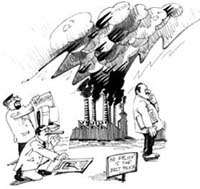Battling climate change
 experts on climate change agree that cost-effective technologies are available to stabilise emissions of greenhouse gases (ghgs) like carbon dioxide, nitrous oxide and methane at a low level, but there is a need to initiate major policy changes to make such a transition. Delegates from about 85 countries met in Accra, Ghana, from February 28 to March 3, 2001 to review existing technologies and measures, which can decrease dependence on fossil fuels and help combat climate change. A report released at the meeting was the third in a series of assessments undertaken by the Intergovernmental Panel of Climate Change (ipcc), an influential body of scientists and experts on climate change. The first report discussed potential changes in climate as a result of global warming, while the second one elucidated the impacts of such changes on various countries.
experts on climate change agree that cost-effective technologies are available to stabilise emissions of greenhouse gases (ghgs) like carbon dioxide, nitrous oxide and methane at a low level, but there is a need to initiate major policy changes to make such a transition. Delegates from about 85 countries met in Accra, Ghana, from February 28 to March 3, 2001 to review existing technologies and measures, which can decrease dependence on fossil fuels and help combat climate change. A report released at the meeting was the third in a series of assessments undertaken by the Intergovernmental Panel of Climate Change (ipcc), an influential body of scientists and experts on climate change. The first report discussed potential changes in climate as a result of global warming, while the second one elucidated the impacts of such changes on various countries.
Climate change experts also noted that the past five years have seen unexpected progress in development of alternate technology to curb ghg emissions, like wind power and fuel cells. Moreover, it is now possible to achieve increased efficiency of hybrid engine cars, end use devices and energy conversion technologies, which can go a long way in stabilising atmospheric ghg concentrations at a safe level. However, they fear that if countries continue to depend on abundant resources of fossil fuels such as coal and oil, whose combustion releases ghgs, it would become difficult to limit carbon emissions during the 21st century resulting in devastating effects. They further pointed that present incentive system with subsidies on fossil fuels encouraged resource-intensive production and consumption patterns leading to increased ghg emissions from all sectors.
ghgs by virtue of their ability to trap heat reflected from the Earth's surface cause global warming resulting in unwanted changes in climate. Since the advent of Industrial Revolution, the world's reliance on fossil fuels like oil and coal has increased leading to a phenomenal rise in ghg concentrations in the atmosphere.
A controversial issue dealt by the experts is that of biological mitigation using sinks. The report concedes that forests, agricultural lands and other terrestrial ecosystems
Related Content
- Review of forest and landscape restoration in Africa
- Renewables in Cities 2021 Global Status Report
- Land degradation neutrality interventions to foster gender equality
- Most EU countries cut CO2 emissions last year: Estimates
- Australia stops payments to Green Climate Fund
- Poorer nations will suffer climate change effects more than richer nations
